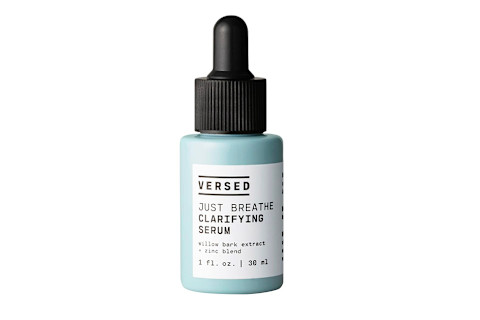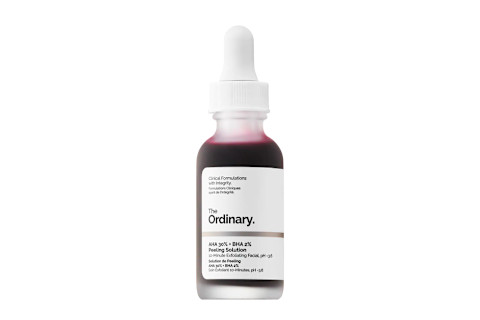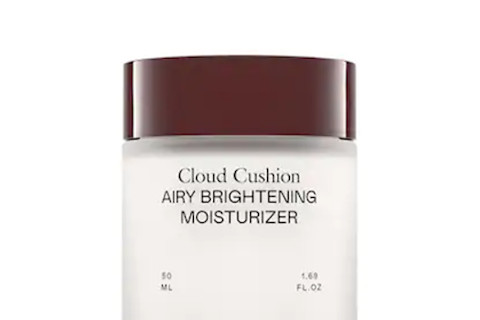If You Want To Clear Your Acne But Don't Know Where To Start, Read This
Skin troubles like acne can make you feel out of control. Whether it be developing breakouts for the first time or seeing a shift in your preexisting acne, this helpless feeling can spur you to implement every treatment option all at once. But that might not be the best idea.
Skin care routines, diets, and daily habits all matter when it comes to caring for your skin, but doing a 180 on every aspect of your life will likely overwhelm your skin. It may even cause you to miss the root cause of your acne in the first place.
We know there are a million places to start when you're trying to clear your skin, but it's not always easy to choose what comes first. To make it easier, we collected a plethora of our expert-led tips and put them in order.
Think of this as a road map to clearing your skin.
How to get clear skin naturally
We explain in detail the steps below, but here's the overview.
- Figure out your skin type + concerns.
- Curate your night and morning skin care routines.
- Find your exfoliation sweet spot.
- Don't skimp on hydration.
- Work from the inside out.
- Mind your sleep & stress.
- Don't pop your pimples.
- Protect your skin from excess sun.
- Practice patience.
- Consult the experts.
Note
Step 1: Figure out your skin type + concerns
The first step to creating a skin care routine in the first place is determining your skin type. Because guess what: Everyone from oil-prone and combination to dry and sensitive can develop acne.
The quickest way to determine whether your skin is oily, dry, or somewhere in the middle is to wash your face and let it sit for about 30 minutes.
If you begin to feel greasy or look shiny all over your face, you may have oily skin. If you look ashy or feel tight, that's a surefire sign you have dry skin. If you feel oily only in the T-zone, you may have combination skin.
You'll then want to determine your skin goals apart from solely clearing acne. Do you want to address signs of skin aging? Brighten your complexion? Deeply hydrate dry skin? All together, knowing your skin type and concerns will help you choose the best products unique to what you need and what you want.
Step 2: Curate your night and morning skin care routines
Now it's time to look for products that will help you get on the path to clearing your skin. Contrary to popular belief, you don't need to have "actives" in every step to clear your skin. In fact, going overboard with these strong ingredients could end up damaging your skin barrier and exacerbating breakouts.
In fact, as pro esthetician and acne expert Sofie Pavitt once told mbg, "Use really active ingredients placed within a really hydrating and barrier-supporting routine whether it's a professional treatment or your home care." Basically, buffer your active ingredients with more gentle, hydrating supporting ingredients.
As for ingredients that address acne: You'll want to use chemical exfoliants, specifically BHAs like salicylic acid, and some form of retinol in your routine. Don't use them on the same evening (aka, cycle through your products), as they can be irritating when mixed.
Cleansing, actives, moisturizer, and SPF are essential for clearing skin. The rest—like toners, face mists, etc.—are all extra. If you're not sure where to spend your money, keep it on the must-haves for now.
If you want more details on this step—here's how to create an oily skin routine from derms and a trusty morning routine in order.
Clear skin routine:
- Gentle, natural cleanser that won't strip or irritate your skin.
- A treatment step, such as a serum with niacinamide, AHAs, BHAs, or retinol. (Check out our favorite retinol serums here.) While you shouldn't use too many active ingredients at once, you can alternate nights that you use them (like skin cycling) or use your use one serum in the day and another at night.
- A barrier-supporting moisturizer to reduce inflammation and hydrate, while also controlling sebum production.
- Sunscreen to protect your skin from UV damage.
Step 3: Find your exfoliation sweet spot
Within your skin care routine, you'll have to determine how often you can exfoliate without irritating the skin. In general, those that are prone to breakouts will want to exfoliate more often than those with super-sensitive skin, but this doesn't mean every day for every person.
Some people can handle daily exfoliation, while others with more sensitive skin maybe only choose to exfoliate twice a week. In the same vein, some people prefer physical exfoliation with gentle scrubs or a soft cloth, while others prefer a chemical exfoliating serum.
If you're new to exfoliating, try incorporating it once or twice a week and move your way up. If your skin begins to feel irritated, consider tapering back.
It may be beneficial to keep a skin journal: Write down what you use on your skin every day and how your skin looks and feels. This will help you connect the dots should something go awry—i.e., your skin gets red, irritated, or blotchy.
Step 4: Don't skimp on hydration
Many people with oily or acne-prone skin worry about using moisturizer, in fear it will cause even more breakouts. The truth: When you skip moisturizing, your skin can become dehydrated, which causes it to produce even more oil to compensate, which can then lead to more breakouts.
You don't have to use a heavy night cream to keep your skin hydrated. In fact, those with oily skin may actually benefit more from a gel or gel-cream formula. Here are our favorite face creams for oily skin if you're ready to press add to cart.
Step 5: Work from the inside out
Your gut and your skin are connected, so your diet does contribute to your skin health. While dairy is the most often discussed food to avoid for clear skin, there's actually a whole lot of evidence to support the correlation between breakouts and:
- High glycemic index foods
- Milk, specifically skim milk
- Greasy foods that are pro-inflammatory
You can read more about why those foods can lead to breakouts here.
In order to determine if these foods could be triggering your acne, you may consider keeping a food diary or writing down notable meals and snacks in your skin journal.
Not everyone wants to track their food, and that's totally understandable. If that method isn't for you, then just try to be mindful of your intake of those foods, or experiment with limiting them in order to test it out.
To substitute, consider plugging in some good-for-skin foods like those rich in omega-3s, pre- and probiotic-rich foods, and those packed with water for extra skin hydration from within.
And finally—remember to drink lots of water. While drinking water won't clear your acne, it will help improve the overall quality of your skin over time.
As a recap...
Step 6: Mind your sleep & stress
Sleep and skin health are very much intertwined. Specifically, a lack of sleep can lead to increased cortisol. This stress hormone is an "important player" in every acne breakout, as researchers state1—occasional acne included.
On the topic of sleep, make sure you change out or clean your pillowcases regularly. (The same goes for anything that touches your face—think towels, makeup brushes, etc. There are lots of fabrics that could be contributing to breakouts, so be mindful of what you're using.)
Stress is another very important factor. Obviously, if you could choose to be less stressed, you would. It's not that easy, and we know that. However, small habits can lead to big changes—so here are 10 science-backed ways to reduce stress in your day-to-day.
Step 7: Don't pop your pimples
If you're going to put all of this work into clearing your skin for good, you'll want to minimize the chance of scars following breakouts too. Popping your pimples is one surefire way to leave marks on the skin—both larger dents and post-inflammatory hyperpigmentation included.
To be frank—just don't do it. While some pimples may be easy and painless to pop, that doesn't mean you should. This goes for at-home extractions too—just avoid it. Scarring is just one of the risks, next to infection, making the pimple more inflamed and drawing out healing time.
mbg tip
Step 8: Protect your skin from excess sun
On the topic of scars, we have to mention sun care when discussing hyperpigmentation. You can develop hyperpigmentation from past breakouts, but skipping SPF can make those marks even darker.
We'd be remiss not to mention the power of antioxidants for photoprotection as well. Astaxanthin, for example, is able to enhance skin photoprotection from UV rays and promotes a healthy inflammatory response. Studies show astaxanthin delays the impacts of UV exposure2 too.
This means internal and external antioxidant boosters are needed—here are our best antioxidant serums and supplements to shop now.
mbg tip
Step 9: Practice patience
While you're trying out a new skin care product or routine, it's essential to practice patience. Of course, this is so much easier said than done. That being said, you may find peace knowing that products like retinoids can take four to six weeks to work and about three months to see dramatic results. The same goes for plenty of other prescription-grade acne products or medications.
Plus, sometimes your breakouts may get worse before they get better—commonly referred to as the retinol purge. This may be discouraging at the moment, but your skin will adjust as time goes on.
If you want to, you can keep a virtual skin journal as well with dated photos to track your progress. For some people, taking weekly photos may help them see small (but exciting) progress even when it's not the most obvious. These photos may be helpful to your dermatologist or esthetician as well should you decide to visit an expert.
For others, taking photos of their skin when it's breaking out may cause more self-consciousness or anxiety about clearing acne—so don't feel pressure to do so.
Step 10: Consult the experts
If you've done all of the previous steps and still find that your skin isn't beginning to clear up, it may be time to consult the experts. Especially for those with cystic or treatment-resistant acne, medical intervention may be the answer, whether it be oral medication or prescription-grade topicals.
Your acne could be hormone-related, in which case many topical remedies and lifestyle changes alone won't clear it. Not sure if your breakouts are linked to hormones? Check out this story to get an idea.
Especially if your acne is affecting your mental health, it's better to do so sooner than later. Research shows that having acne can even be a traumatic experience for some, directly affecting their relationships, self-esteem, work life, and more.
So if you're struggling with your mental health, visiting a psychologist could be a great addition to your clear skin plan—one that's often overlooked yet life-changing for so many. Here's how to find a therapist for your needs.
What causes breakouts
Acne is a very complex skin condition. There are several factors that contribute to the formation of acne. On a basic level, sticky skin cells and excess sebum production clump together and clog your pores, trapping bacteria underneath and triggering inflammation.
This process can be triggered or influenced by the following factors:
- Diet
- Hormones
- Sleep
- Stress
- External stressors
- Topical products
- An unbalanced skin microbiome
FAQ
How can I clear my skin naturally without products?
The best way to control acne—without the use of products—is to address lifestyle factors such as your diet, stress, getting adequate hydration, sleeping well, and keeping your hands off your active breakouts.
How can I clear my skin at home?
There are many at-home ingredients that can help deal with breakouts should you want to go down the DIY route, such as aloe vera, tea tree oil, apple cider vinegar toner, rose water toner, and jojoba oil.
The takeaway
All in all: Starting out on the process to clearing your skin can be overwhelming, but remember to take it one step at a time and try your best to practice patience. Acne is a complex skin condition with a long list of causes, treatments, and tips—here's our beauty breakdown on acne if you want to learn more about how it works.
Editor's Note
Editor's Note
October 2024
We've recently reviewed this article and recognized that the previous version did not adequately emphasize the importance of patch-testing new remedies. We have since revised the content to reflect this critical information, ensuring a safer and more effective approach to natural skincare.













